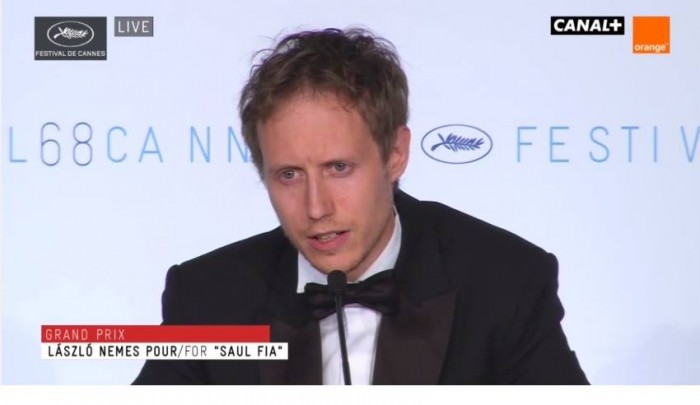On a popular television news talk show called Civil Kaszinó, which airs on the right-wing HírTV network, pro-government intellectuals managed to come up with a remarkably passive aggressive response to something that should have been positive news for all Hungarians: namely, that László Nemes’ film Son of Saul (Saul fia) won the Grand Prix at the Cannes film festival. The 38 year old Mr. Nemes completed much of his work as a young, aspiring filmmaker in Paris and New York, and in fact he developed the script that would form the basis for Son of Saul in France. The thriller, which received over $1 million in financial support from the Hungarian National Film Fund, focuses on the life of Auschwitz prisoner Saul Ausländer, who is forced to work in the concentration camp’s crematorium. One critic wrote for the IndieWire site that the film was “a remarkable refashioning of the Holocaust drama,” thanks to its “bracing cinematic energy.”
But in responding to Mr. Nemes’ success, the most prominent public thinkers behind the Orbán government managed to drag up every antisemitic misconception and prejudice that exists and thrives in Hungary today, namely:
- Jews dominate all film festivals and the movie industry in general, so it’s “clever” to produce films on the Holocaust;
- Yet again, another Hungarian work on a Jewish topic wins an international prize, but there seems to be no interest in non-Jewish Hungarian history;
- Hopefully critics of the Orbán government will stuff it, because this film proves that the “accusation” of there being growing antisemitism in Hungary is clearly false.
So what did the participants in Civil Kaszino say, exactly?
Tamás Fricz, the Orbán government’s most loyal political scientist, offered the following thoughts:
“Well it seems–let’s be honest–that the topic of the Holocaust enjoys great popularity at all major film festivals…and probably not just in Cannes, but also at the Oscars. Obviously, as Hungarians, we offer our congratulations. Keep up the good work, go for it!”
Historian Zsolt Hernády then chimed in, commenting that “the choice of topic was clever.”
“We haven’t seen the film yet, but we’re awaiting with interest what new vantage point it will bring to this theme,” said Mr. Hernády, who of course was referring to the Holocaust. To a degree, both Imre Kertész’s Nobel prize winning book Fateless (Sorstalanság), and the 2005 film that followed brought a somewhat new concept to the surface: that of the tragedy and horror of concentration camps forming identity and community, even among heavily assimilated and non-religious Hungarian Jews. But Mr. Hernády’s comments about the topic being a “clever choice” for a new filmmaker echoed Mr. Fricz’s views on the “popularity” of Holocaust-related narratives in the film industry.
Actor György Dörner also offered an unenthusiastic, perfunctory congratulations to the filmmaker, before noting:
“I should hope that the director’s next film might focus on the Battle of Pressburg.” The Battle of Pressburg (in Hungarian the Battle of Pozsony) was a war in the year 907 when Hungarian Grand Prince Árpád defeated the Bavarians and allowed the Hungarian forces and the nascent Hungarian state to keep some of the Germanic principalities in check. In reality, however, relatively little is known about the details of the battle.
Following Mr. Dörner’s comments, Mr. Fricz noted that he is “hopeful that this film’s success and considering that Lajos Koltai created the film Fateless on this same theme, will demonstrate that the accusation of antisemitism against Hungary does not hold water. They are always accusing us of Jews not being able to live here, and that they are in an increasingly perilous situation.” noted Mr. Fricz, who then said that there is far less antisemitism in Hungary than in other European Union countries.
Much like with the public reception of Mr. Kertész’s Nobel prize, the Hungarian right is once again visibly irate at the fact that a Hungarian cultural product about the Holocaust was recognized internationally.
Only one prominent Hungarian right-wing television personality affiliated with HírTV distanced himself from this chatter. Sándor Csintalan, who in the nineties worked for the Hungarian Socialist Party (MSZP), but then later decided to support Fidesz, apologized for what happened on Civil Kaszinó. “I’m sorry. They don’t know what they are saying,” posted Mr. Csintalan to Facebook, after seeing the truly dire footage.
But the views expressed in the video are, unfortunately, shared by many on the right. For instance, after the Embassy of Hungary in Ottawa published a note about the film’s success on its Facebook page, an Internet user commented below the post. “It looks like the film got the award because of the topic,” quipped a Hungarian Canadian from Guelph, Ontario, on the embassy’s Facebook wall.
This very much brings back a feeling of déjà vu. In 2002, after Imre Kertész received the Nobel prize for literature, the reaction within much of Hungarian society was almost identical.




